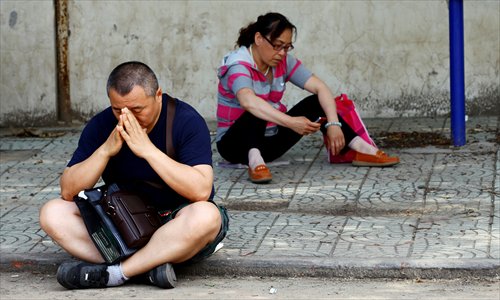Divorce boom follows gaokao among parents sensitive to kids' exam stress

For high school students in China, the pressure of taking the gaokao, or national college entrance exams, can be difficult enough to manage by itself. But for Wang Li (pseudonym), tackling the test was another struggle to cope with amid her own personal turmoil from her parents' planned separation. While she was frantically preparing for the exam four months ago, she learnt her parents were planning to divorce.
Statistics from courts confirmed a post-gaokao divorce boom last week following the exam's conclusion on June 8. Many parents facing irreconcilable differences agree to delay their divorce until after their child has taken the all-important exam in the hope that their breakup won't affect their child's gaokao performance.
The Chaoyang district court in Beijing has seen a spike in divorces after the exam each year from 2008 to 2011, with the annulment frenzy usually lasting until August.
Last year the number of divorces filed 20 days after the exam was more than twice as high as the figure for 20 days before it, according to the Chaoyang district court. Elsewhere at southern Beijing's Daxing district court the figure is even higher, with 145 divorces filed 20 days after the gaokao last year compared to 38 filed 20 days before.
School's out, divorce is in
Wang, a 17-year-old high school graduate from Southwest China's Chongqing municipality, was a model student who regularly topped her class in many subjects. However, all that changed in February, when she overheard her parents discussing their divorce after the gaokao, spiraling Wang into depression.
Her grades soon plunged and she even threatened to her parents that she would drop out of school if they went ahead with their divorce, the Chong-qing Morning Post reported earlier this month.
The Chongqing Morning Post reported that Wang's parents settled their differences and agreed not to separate after undergoing marriage counseling, resulting in the improvement of Wang's studies.
But not all couples are able to rescue their marriage from the rocks, with divorces often inflicting long-term mental anguish on children already struggling to cope with the pressure of the gaokao.
The Beijing civil affairs bureau told the Global Times it did not have figures for the number of divorces made citywide after the gaokao this year. However the Legal Mirror reported that an employee from the Haidian district marriage registration office said an average of 20 couples daily had filed for divorce after the exam, with more than half aged in their 40s.
"We used to get mostly young couples filing for divorce, but lately there have been more middle-aged ones," the employee, who asked to remain anonymous, told the Legal Mirror. "They often go through it quickly without fighting like young couples. It seems they have agreed to separate long before."
'Gaokao clause' in court
Regardless of whether parents believe their high school-aged children are mature enough to handle their divorce before or after the gaokao, experts agree the breakdown of a marriage always affects children even if they don't show it.
"Some students show me their scars from self-harm or say they have contemplated suicide because of seeing their parents fight or plan a divorce ahead of the gaokao," said Wang Jianyi, an adolescent psychologist and consultant to the Institute of Psychology at the Chinese Academy of Sciences.
Many high school students feel helpless and even guilty about failing to save their parents' marriage, she told the Global Times.
"Kids won't feel better if their parents divorce after the exam, as many parents use their children as the sole excuse to stay together," Wang said. "This can lead to children feeling like a burden or an obstacle to their parents' happiness."
The Legal Mirror alleged that a court in Beijing had used the gaokao as a reason to reject parents' applications for divorce, adding that it was more likely for a parent to get a favorable ruling if the annulment came after their child's exam.
Parents are obligated to provide a harmonious living environment for their child before they take the gaokao, the Legal Mirror reported, citing a verdict from an unnamed court, as most of the 152 pre-gaokao divorce cases since 2008 had been overruled.
Separate or salvage?
"In most pre-gaokao divorce cases, only one parent wants the divorce while the other disagrees on account of their child preparing for the gaokao," said Yang Xiaolin, a Beijing lawyer who specializes in marriage law.
Although there is no clear precedent that states applications for pre-gaokao divorces should be rejected, judges are more likely to approve divorces after major exams to minimize the influence on children, Yang said.
The emphasis from society to give students the best opportunity to succeed in the gaokao is one of the reasons for the divorce boom after the exam, said Hao Pengfei, director of the China Social Work Association Working Committee on Marriage and Family at the Ministry of Civil Affairs.
"The gaokao means a great deal for Chinese high school students, as a college education basically offers insurance for their future," he said. "A couple I know had separated for years. The only reason they didn't divorce before the exam was that they didn't want others to gossip."
To some parents, the end of high school signals the coming-of-age of their child thus making it an ideal time to file for divorce. Still, there is no set age for a child to adequately manage the distress caused by the separation of their parents.
"Parents might be a little selfish if they pursue their own happiness at the cost of their marriage, as a 17-year-old might not be mature enough to handle the change," noted Chu Zhaohui, a researcher with the China National Institute for Educational Research.